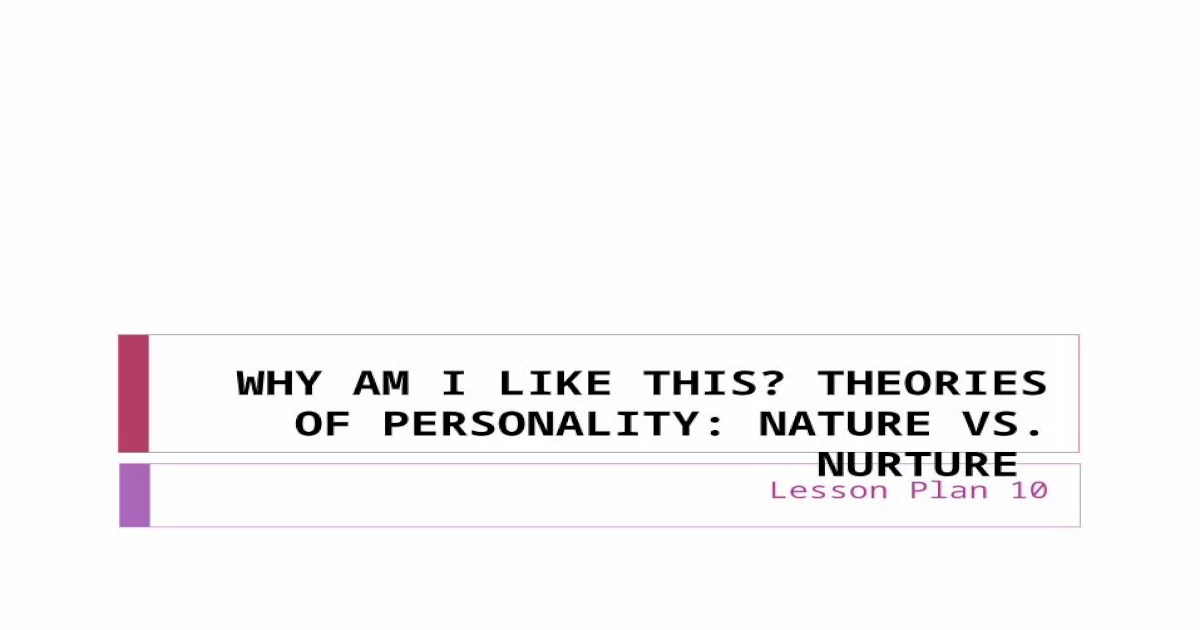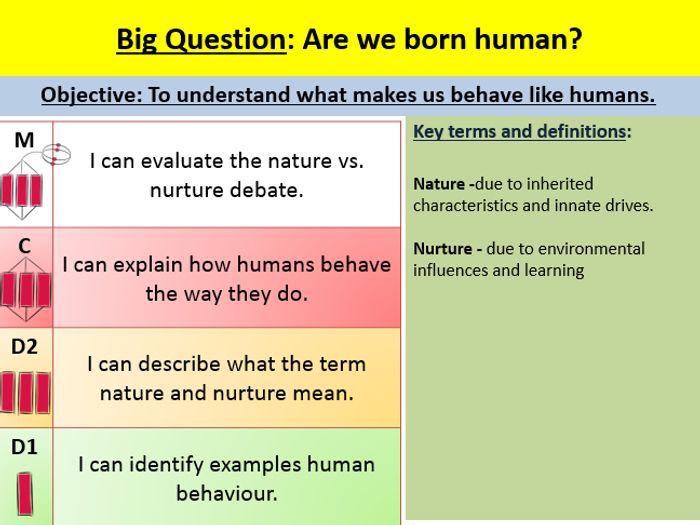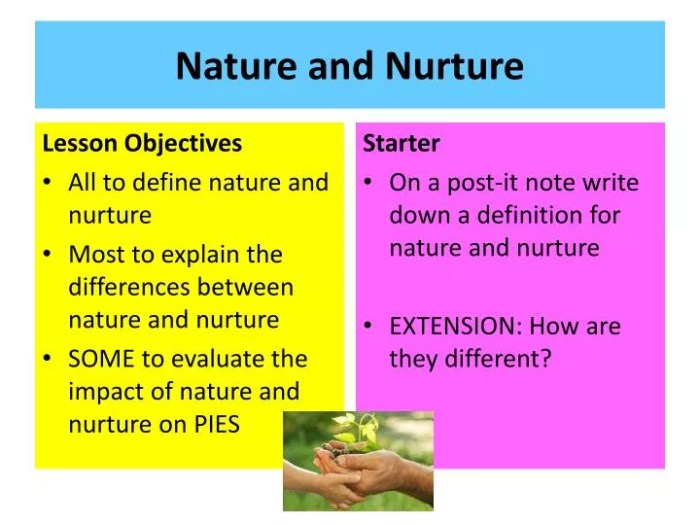Nature vs nurture lesson plan – Embark on an exploration of the age-old debate: nature vs nurture. Delve into the intricate interplay of genetics and environment that shapes human development, shaping our behaviors, traits, and experiences.
From the depths of our DNA to the nurturing embrace of our surroundings, this lesson plan unravels the multifaceted influences that mold us as individuals.
Introduction

The nature vs nurture debate explores the relative contributions of genetics (nature) and environment (nurture) in shaping an individual’s traits and characteristics.
This long-standing discussion has its roots in ancient philosophy and continues to be a subject of intense scientific research and societal discourse.
Historical Perspective
Historically, philosophers such as Plato and Aristotle emphasized the role of innate qualities (nature), while others like John Locke stressed the importance of experiences and learning (nurture).
Nature

Nature refers to the biological and genetic factors that contribute to an individual’s development. These factors include inherited traits, physical characteristics, and certain behavioral predispositions.
Role of Genetics and Biology
Genetics play a significant role in determining an individual’s physical and mental attributes. Genes, which are inherited from both parents, carry instructions that guide the development of various traits. These traits can range from physical characteristics such as eye color and height to behavioral tendencies and cognitive abilities.
Biology also influences human development through factors such as hormonal balances, brain structure, and overall health. These biological factors can affect an individual’s personality, temperament, and even their susceptibility to certain diseases.
Inherited Traits and Behaviors
Some traits and behaviors are strongly influenced by genetics. For example, physical characteristics such as eye color, hair texture, and height are largely determined by inherited genes. Similarly, certain behavioral traits, such as extroversion or introversion, have been linked to genetic predispositions.
To help you plan your nature vs nurture lesson, you might want to have a look at the gizmo weather maps answer key . The answer key can provide some valuable insights into the lesson’s concepts and can help you to prepare engaging activities for your students.
It is important to note that genetics do not solely determine an individual’s development. Environmental factors, such as upbringing and experiences, also play a significant role in shaping who we are.
Nurture
Nurture encompasses the environmental factors that shape human development, including family, culture, and education. These influences play a crucial role in molding our beliefs, values, behaviors, and overall well-being.
Family
The family unit is a primary source of nurture, providing children with love, support, and guidance. Parents and siblings shape children’s emotional development, social skills, and self-esteem. Family values and traditions also influence children’s worldview and future aspirations.
Culture
Culture refers to the shared beliefs, values, customs, and practices of a particular society. It influences our thoughts, behaviors, and relationships. Cultural norms and expectations shape our understanding of appropriate and inappropriate behaviors, as well as our views on gender roles, family structures, and education.
Education, Nature vs nurture lesson plan
Education provides individuals with knowledge, skills, and critical thinking abilities. Formal education through schools and universities enhances cognitive development, problem-solving skills, and overall intellectual capacity. Education also plays a role in shaping our values, beliefs, and career paths.
Interaction of Nature and Nurture: Nature Vs Nurture Lesson Plan

Nature and nurture are not independent forces; they interact continuously to shape human development. Genes provide the blueprint for an individual’s potential, while the environment influences how that potential is realized.
One example of how genes and environment interact is in the development of intelligence. Genes provide the basic cognitive abilities, but the environment can influence how those abilities are developed. Children who grow up in stimulating environments with access to education and enrichment activities tend to have higher IQ scores than those who grow up in impoverished environments with limited opportunities.
Epigenetics
Epigenetics is the study of how environmental factors can affect gene expression without changing the DNA sequence itself. For example, research has shown that children who experience early childhood trauma are more likely to have epigenetic changes that increase their risk of developing mental health problems later in life.
Educational Implications

Understanding the nature vs nurture debate has profound implications for education. It helps educators tailor their teaching methods to maximize student potential and create effective learning environments.
By acknowledging the role of both nature and nurture, educators can recognize that students have varying abilities and learning styles. This understanding allows them to differentiate instruction, providing targeted support and challenges to meet individual needs.
Teacher’s Role
Teachers play a crucial role in fostering a positive learning environment that nurtures both nature and nurture. By providing stimulating experiences and opportunities, they can help students develop their innate abilities and overcome environmental challenges.
- Create a Growth Mindset:Encourage students to believe in their ability to improve and learn, regardless of their perceived limitations.
- Provide Personalized Learning:Tailor instruction to each student’s unique strengths and weaknesses, ensuring they receive appropriate support and challenges.
- Foster a Supportive Classroom Culture:Create a safe and encouraging environment where students feel comfortable asking questions and taking risks.
By embracing the principles of nature vs nurture, educators can empower students to reach their full potential and become lifelong learners.
Conclusion

In conclusion, the nature vs. nurture debate highlights the complex interplay between genetics and environmental factors in shaping human development. Understanding the contributions of both nature and nurture is crucial for educators, as it informs pedagogical practices that effectively support students’ growth and learning.
Resources for Further Exploration
To delve deeper into the topic, explore the following resources:
- Nature vs. Nurture: A Complex Interplay – https://www.ncbi.nlm.nih.gov/pmc/articles/PMC4926365/
- The Nature-Nurture Debate: A Historical Perspective – https://www.ncbi.nlm.nih.gov/pmc/articles/PMC4693880/
- Nature and Nurture: The Complex Interplay – https://www.apa.org/science/about/psa/2018/09/nature-nurture
Essential Questionnaire
What is the nature vs nurture debate?
It explores the relative contributions of genetics (nature) and environment (nurture) in shaping human characteristics and development.
How do nature and nurture interact?
They work together, with genes providing a foundation and environment influencing how those genes are expressed.
What are the implications of nature vs nurture for education?
Educators can tailor learning environments to meet the unique needs of students, considering both their genetic predispositions and environmental experiences.




